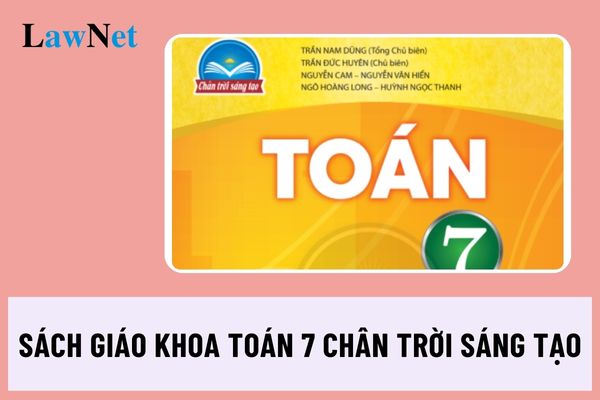Which document stipulates regulations on grade 7 mathematics textbooks of the "Chan troi sang tao" curriculum in Vietnam?
Which document stipulates regulations on grade 7 mathematics textbooks of the "Chan troi sang tao" curriculum in Vietnam?
Based on the list of Grade 7 textbooks used in general educational institutions issued with Decision 441/QD-BGDDT in 2022, the list of Grade 7 mathematics textbooks of the "Chan troi sang tao" curriculum used in general educational institutions is as follows:
| No. | Title | Authors | Publisher |
|---|---|---|---|
| 1 | Mathematics 7, Volume One (Chan troi sang tao) | Tran Nam Dung (General Editor), Tran Duc Huyen (Editor), Nguyen Cam, Nguyen Van Hien, Ngo Hoang Long, Huynh Ngoc Thanh. | Vietnam Education Publishing House |
| 2 | Mathematics 7, Volume Two (Chan troi sang tao) | Tran Nam Dung (General Editor), Tran Duc Huyen (Editor), Nguyen Cam, Nguyen Van Hien, Ngo Hoang Long, Huynh Ngoc Thanh. | Vietnam Education Publishing House |

Which document stipulates regulations on grade 7 mathematics textbooks of the "Chan troi sang tao" curriculum in Vietnam? (Image from the Internet)
What are requirements for the contents of the grade 7 mathematics textbooks of the "Chan troi sang tao" curriculum in Vietnam?
Based on Article 5 of the Regulation on standards, procedures for compiling, editing textbooks; standards of organizations and individuals compiling textbooks; organization and activities of the National Council for Appraisal of Textbooks issued with Circular 33/2017/TT-BGDDT, the content of the Creative Horizons Grade 7 mathematics textbook must meet the following requirements:
- The content of the textbook must accurately and fully reflect the content of the curriculum; ensure fundamental, scientific, practical aspects and be suitable to the context of Vietnam.
- Terms, concepts, definitions, data, events, images must be accurate, objective, consistent and appropriate for student levels; with clearly sourced data, events, images.
- New scientific achievements related to the curriculum are updated, meeting international integration requirements and aligning with the goals of the curriculum.
- Educational content on national sovereignty, human rights, children's rights, gender equality, sustainable development, environmental protection, and adaptation to climate change should be reasonably included.
What are the evaluation methods of mathematics education results according to the latest program in Vietnam?
Based on Section 7 of the Curriculum for General Education in Mathematics issued with Circular 32/2018/TT-BGDDT, the evaluation methods of mathematics education results according to the latest program are as follows:
Apply a combination of many forms of evaluation (process evaluation, periodic evaluation), and many evaluation methods (observation, recording execution process, interviews, objective testing, essays, written tests, practical exercises, learning projects/products, practical tasks, ...) at appropriate times.
Process evaluation (or regular evaluation) is organized by the subject teacher, combined with evaluations by teachers of other subjects, self-evaluations by the evaluated students, evaluations by classmates or evaluations by parents.
Process evaluation should align with the learning activity progression of students, avoiding separation between teaching and evaluation processes, ensuring the goal of evaluation for student learning improvement.
Periodic evaluation (or summative evaluation) mainly aims to assess learning objectives. Periodic and summative evaluation results are used to certify learning levels and recognize student achievements. Periodic evaluation is organized by the educational institution or through national testing and evaluation programs.
Periodic evaluation also serves to manage teaching activities, ensuring quality at educational institutions and developing the mathematics curriculum.
Evaluate student competencies through observable evidence of their achievements during their actions.
The evaluation process includes basic steps such as determining evaluation objectives, identifying necessary evidence, selecting appropriate evaluation methods and tools, collecting evidence, interpreting evidence, and providing feedback.
Focus on selecting methods and tools to evaluate the components of mathematical competency. Specifically:
- Evaluate mathematical thinking and reasoning competency: Use questions (oral, written), exercises that require students to present, compare, analyze, aggregate, systematize knowledge; use mathematical knowledge to explain and reason.
- Evaluate mathematical modeling competency: Choose real-life situations that give rise to mathematical problems, requiring students to identify mathematical models (including formulas, equations, tables, graphs, ...) for real-life situations in the problem; solve mathematical problems in the established models; interpret and assess solutions in real-life contexts and improve models if solutions are not appropriate.
- Evaluate mathematical problem-solving competency: Use methods that require learners to recognize situations, identify and present problems to be solved; describe and explain initial information, goals, and expectations of the situations under consideration; collect, select, arrange information and connect with existing knowledge; use questions (oral or written answers required) that require learners to apply knowledge to solve problems, especially real-life problems;and use observation methods (such as checklists with predetermined criteria), observe learners during the problem-solving process; evaluate through learners' practical products (such as outputs of learning projects); reasonably consider integrated assessment tasks.
- Evaluate mathematical communication competency: Use methods that require learners to understand and interpret, record (summarize), analyze, choose, extract essential mathematical information from spoken or written texts; use mathematical language combined with ordinary language to present, express, ask questions, discuss, and debate mathematical content, ideas, solutions in interaction with others.
- Evaluate the competency of using mathematical tools and means: Use methods that require learners to recognize the names, functions, usage specifications, maintenance methods, advantages, and limitations of mathematical tools and means; present the (reasonable) use of mathematical tools and means in performing learning tasks or explaining mathematical reasoning and proofs.
When teachers plan their lessons, criteria and methods for evaluation must be established to ensure that at the end of each lesson, students meet the basic requirements based on these criteria before moving on to the next learning activities.
>> See the General Education Curriculum in Mathematics issued with Circular 32/2018/TT-BGDDT:

